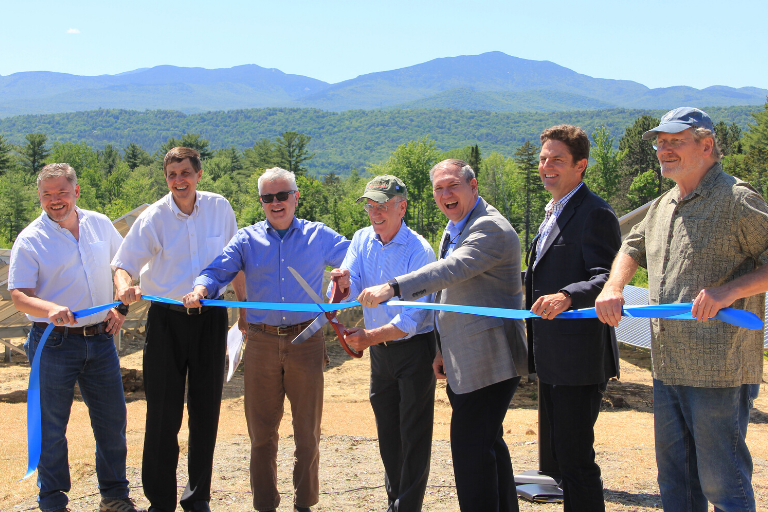
Congressman Welch at ribbon cutting for 855 kW solar project completed by Encore Renewable Energy and the Vermont Public Power Supply Authority in Morrisville VT (June 2019).
Renewable Energy Vermont (REV) announced that it will join Representative Peter Welch and 165 other Members of Congress in calling for an extension of the investment tax credit (ITC) for renewable energy investments, including energy storage. The Renewable Energy Extension Act will extend the current tax credit for investments in renewable energy and expand it to include energy storage.
The Investment Tax Credit has been a key driver in the growth of Vermont’s solar economy. All over the state, Vermonters have been able to switch to renewable energy because the federal ITC provides a 30% tax credit for the cost of a solar system. Increased demand for solar has, in turn, created thousands of local jobs for Vermonters.
As Olivia Campbell Andersen, REV’s Executive Director notes, the benefits of this tax credit extend far beyond the individual consumer. “This federal tax credit creates local solar jobs at the same time that it helps us meet our climate commitments by lowering greenhouse gas pollution. We are grateful for Congressman Welch’s work to extend the tax credit and to include energy storage as we need a more climate resilient energy system.”
“Renewable energy is one of the fastest growing sectors of Vermont’s economy, currently employing one in every 16 Vermonters” she notes. “This tax credit fuels the creation of local solar jobs at the same time that it helps us meet our climate commitments by lowering greenhouse gas emissions.”
The growth of solar and energy storage also helps local communities withstand catastrophic weather events like the recent Halloween storm. Every Vermonter and every community should be empowered to generate their own energy. Local power generation is essential to a resilient energy system and the Investment Tax Credit is a proven way to get there.
In addition to the letter sent by the 166 members of congress, more than 70 organizations, including REV, representing a great diversity of interests across all 50 states also sent a letter urging Congress to pass the Renewable Energy Extension Act. “It’s not every day that you see higher ed advocates and farm families agree on energy policy,” said Abigail Ross Hopper, president and CEO of the Solar Energy Industries Association (SEIA). “Extending the Investment Tax Credit is common sense and this effort shows us just how many people, communities, and interests it touches. Whether you want to reduce emissions, stimulate economic investment, or create jobs, the ITC is a proven policy that can do all of those things.”
Representative Welch’s leadership on this and other climate issues comes at a critical time for our environmental future. “It is indisputable that climate change is a grave threat to our environment, public health and the economy,” Welch said. “Its effects are already being felt by Vermont’s sugar makers, ski areas, and farmers. Time is of the essence.” If it is not extended, the ITC will begin stepping down at the end of 2019 before it drops to 10% for commercial and utility-scale customers and faces permanent elimination for residential customers in 2022.
As long as the green energy future of Vermont is on the line, Renewable Energy Vermont will join Representative Welch in fighting to extend the ITC.
Learn more about the campaign to defend the ITC: seia.org/defendtheitc
